National Geographic Quest
By Lynn & Cele Seldon.
With the addition of the National Geographic Quest last summer, Lindblad Expeditions welcomed a host of firsts for the line and for expedition cruise ships in general. We found out first hand when we were aboard the Quest shortly after it debuted.
The seventh in Lindblad's fleet, the Quest is the company's first-ever new build and the most advanced expedition ship — and first vessel of its kind — to be built entirely from scratch in the United States. Nichols Bros. Boat Builders on Whidby Island, Washington, used its 50 years of experience to help Lindblad celebrate its 50th anniversary in style.
Built for the state-of-the-art expeditionary travel that Lindblad is known for, the four-deck Quest accommodates 100 passengers in 50 outside cabins, including 22 with step-out balconies — the most of any ship in the fleet — and six sets of adjoining cabins for families and groups. Also of note: she is the first ship traveling in Alaska, the Pacific Northwest and Central America to have a designated mud room for expedition gear.
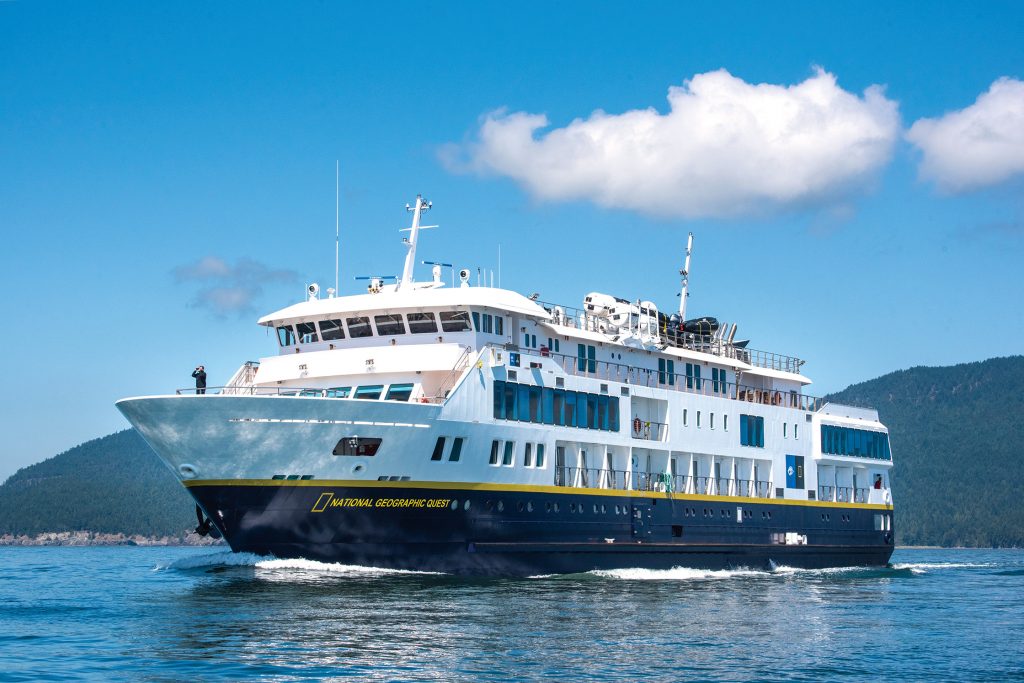
National Geographic Quest. * Photo: Lindblad Expeditions
The Lounge is Command Central
The heartbeat of the 2,920-gross-ton ship is the lounge, found forward on the Lounge Deck. This hub of activity provides a large space for hosting cocktail hours, daily recaps, presentations about the destinations and underwater world, photography talks and guest speakers. Featuring comfortable seating with banquettes, cozy sofas and coffee tables, the circular design takes full advantage of floor-to-ceiling wraparound windows.
There are eight flat-screen televisions for slide shows, destination briefings, documentaries and other movies. The lounge has a 24-hour, self-service beverage station with complimentary coffee, tea, espresso, soft drinks, beer, water, ice and snacks. Its cocktail bar is typically open from 11 a.m. until an hour after lunch begins and from 5 p.m. until late, offering a variety of beverages for purchase, including wines by the glass or bottle, spirits, cocktails and specialty drinks.
Tucked into a corner of the lounge is a small library with reference materials, along with fiction and non-fiction books, board games, cards, and binoculars and musical instruments for use by staff and passengers. The library also houses two Apple photo-editing stations for use on a first-come, first-served basis to sort and transfer photos; there's even a photo instructor to assist passengers.
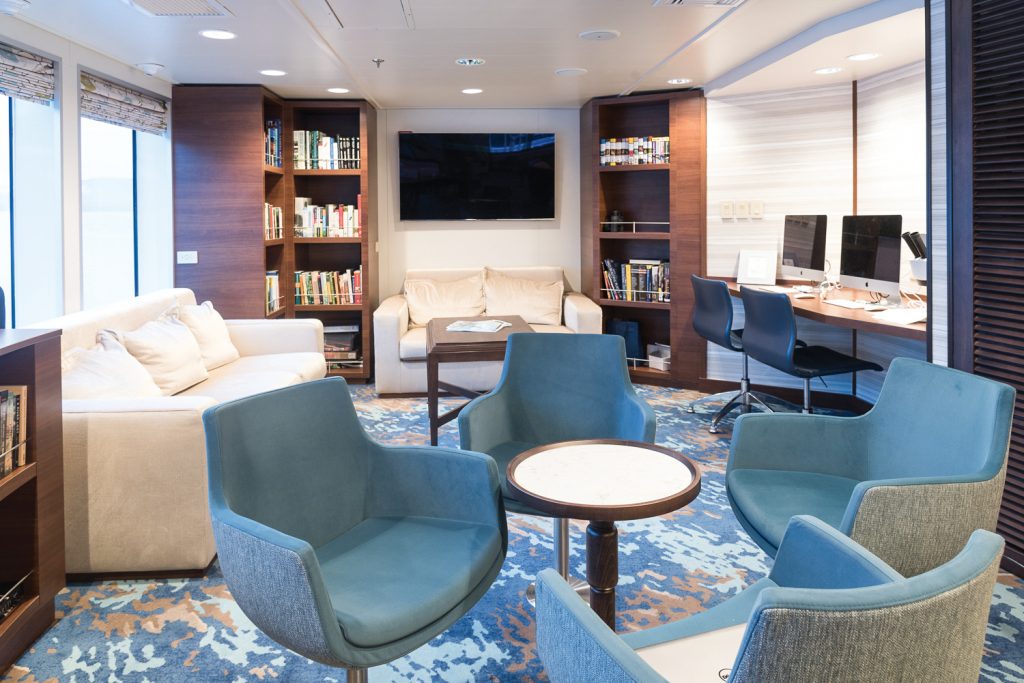
Library and photo kiosk aboard National Geographic Quest. * Photo: Lindblad Expeditions
A doorway on the lounge's starboard side provides access to the bow for unobstructed viewing of wildlife and scenery. The specially-designed, multi-level bow observation area can accommodate the entire expedition community for shared wildlife viewing and expedition-leader commentary.
With sharp attention to the observation experience, they have separated the anchoring gear from the guest space, allowing for multiple tiers of guests with clear viewing lines. Staircases on either side of the bow lead to another expansive observation deck one level up.
For more great QuirkyCruise features delivered to your inbox, sign up for our monthly newsletter.
Other Public Spaces
Aft on the Lounge Deck is a corridor with restrooms and an elevator that accesses all four decks. Public spaces-including the corridors and hallways-feature stunning photography by National Geographic and Lindblad Expedition photographers and naturalists. Beyond the corridor is the Global Gallery, a market with items made by artisans in places that Lindblad explores.
Merchandise includes silver jewelry crafted in Alaska, woven baskets from Panama, expedition clothing, Lindblad- and National Geographic-branded items, and paintings, photography and books by the naturalist staff. Five percent of all purchases in the Global Gallery are contributed to the Lindblad Artisan Fund, which supports artisan communities around the world in helping develop artistic potential, and are matched dollar-for-dollar by the Lindblad-National Geographic Fund.
Spiritual and physical wellness are cornerstones for Lindblad, and that commitment is found at the ship's fitness center and spa. The surprisingly large gym is outfitted with treadmills, exercise bikes, elliptical machines, exercise bands and hand weights. The adjacent LEXspa offers massages, body treatments, facials, and hand and foot services. Both are staffed by an onboard wellness specialist, who leads revitalizing outings that complement onboard efforts to explore, uplift and rejuvenate.
Expedition Dining Adventures
The back of the Lounge Deck houses a bright, spacious dining room decorated in cool blues and beiges. Wraparound floor-to-ceiling windows bring in plenty of natural light and take advantage of the passing scenery. Meals feature fresh, local foods sourced from suppliers that share Lindblad's commitment to sustainability.
The single, open seating helps create an informal and jovial dining atmosphere. Expedition leaders, naturalists and guest speakers often mingle with guests in the dining room, sharing stories about their experiences and the destinations.
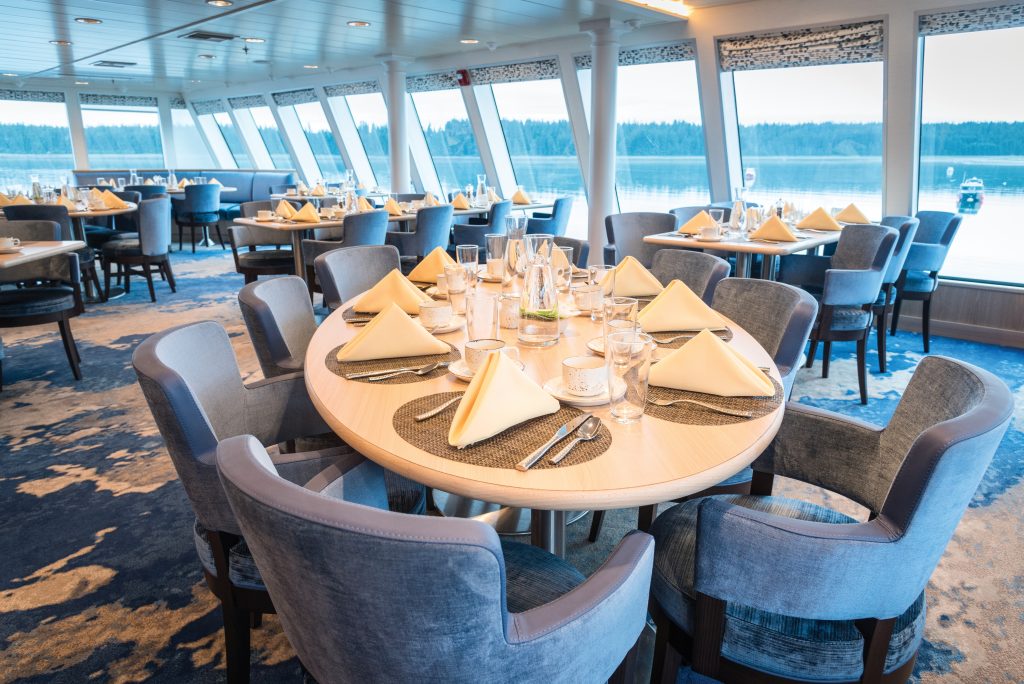
Dining room aboard National Geographic Quest. * Photo: Lindblad Expeditions
The double-sided buffet hosts a station for made-to-order egg dishes for breakfast and pastas and roasted carved meats for lunch. While breakfast is served buffet style, lunch is a hybrid between buffet and family style, with soups, composed salads and a complete salad bar, plus a dessert/bread station offering all types of made-on-board breads with jams and spreads, miniature desserts, a beverage station with fruit juices and flavored waters, and a gluten-free station.
Dinner is served as a three-course plated menu and typically features a meat, a local sustainable fish and a vegetarian option, along with an appetizer and dessert. Menus are designed to highlight the region where the ship is traveling. The chef will occasionally take advantage of a destination by serving special menus of indigenous items, like a crab feast in Petersburg, Alaska, or a traditional Panamanian menu during a Panama Canal crossing. Wine and cocktails are available for purchase, while coffee, coffee drinks and tea are complimentary.
One level up is the Observation Deck, which houses eight suite cabins as well as the Sundeck and Bridge. The aft sundeck hosts morning stretching and yoga classes when the weather permits and becomes a lounging deck afterwards, complete with tables and chairs and chaise lounges. It can accommodate all 100 passengers at one time. The sundeck bar serves beverages and light food when weather conditions allow.
The Observation Deck offers a 360-degree promenade that allows for walking from the sundeck to the forward bridge/observation area. Lindblad Expeditions operates with an open bridge policy, inviting guests to observe the navigation process. The bridge has been designed to welcome guests with forward standing areas and comfortable spaces to sit while enjoying the view, drinking their morning coffee, and chatting with the officers about the ship, navigation or the destination.
Expedition Toys & Gear
The Upper Deck and Main Deck house varied categories of cabins. The mud room is all the way aft on the Main Deck. Taking cues from several of Lindblad's other ships, the Quest will be the only ship in the Alaska/Pacific Northwest and Central America regions of exploration to feature such a room for the storage of guest expedition gear. This area, where passengers embark and disembark expedition landing craft, has lockers that provide storage of boots, snorkeling equipment and other gear, making excursions more efficient and leaving cabins cleaner.
The exploration side of things is truly what sets Lindblad, and especially the Quest, apart in the expedition-ship category. Featuring twin expedition craft landing platforms off the back of the mud room, the Quest can transfer guests quickly to the fleet of eight Mark V ‘ Zodiacs. Built entirely in the U.S ., these 19-foot, top-of-the-line, military-grade Zodiacs were designed specifically for the Quest and are powered by four-stroke outboard engines. They are capable of comfortably carrying 10 to 12 people and have enhanced safety measures like non-skid surfaces to improve footing and extra grab holds for passenger stability.
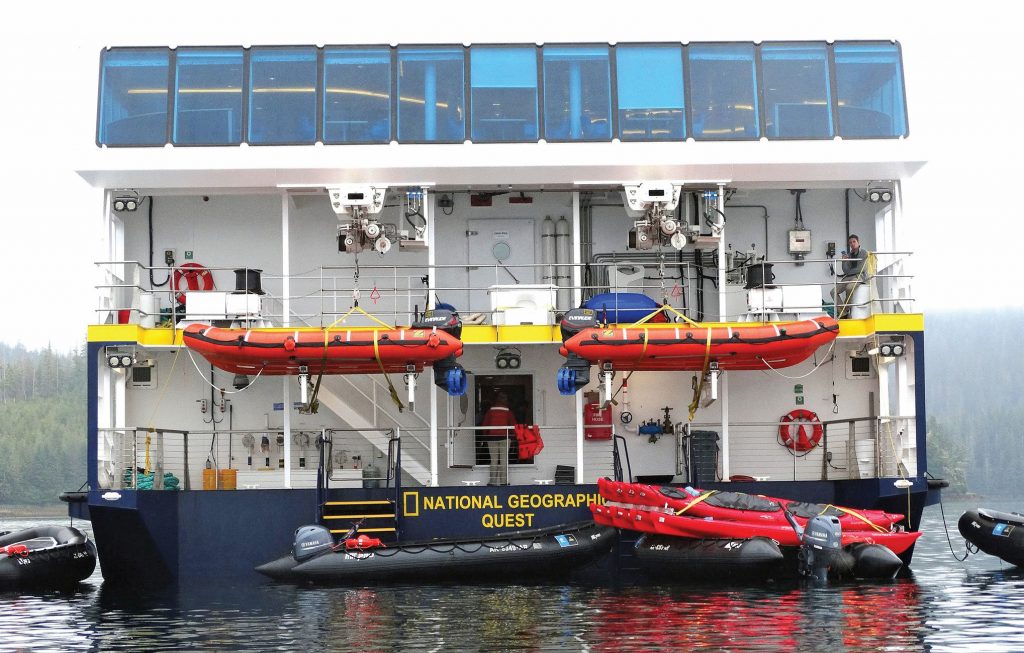
At the aft deck, twin marina platforms are used to disembark guests quickly and safely to start exploring with no idle waiting. * Photo: Lindblad Expeditions
For additional exploration possibilities, the Quest carries 24 two-person kayaks, 10 paddleboards, and snorkeling gear and wetsuits. It also features cutting-edge imaging and audio equipment to explore the world below, including a remotely operated vehicle capable of reaching 1,000 feet below the surface, far below the range of any scuba diver; an underwater camera that the onboard undersea specialist will use to shoot high-definition footage; a video microscope to help explain the natural environment; and a hydrophone (an underwater microphone deployed to listen to the sounds of marine mammals).
Adventures in Sleeping
Accommodations on board the Quest are comfortable and quite plush for the expedition genre. Cabins range from the 136-square-foot Category 1 to the 187-square-foot Category 5 suite. Category 1 and 2 cabins on the Main Deck feature two twin beds that can convert to a queen, nightstands, a writing desk and two portholes. The en suite bathrooms are a bit snug, with those in Category 2 being slightly larger.
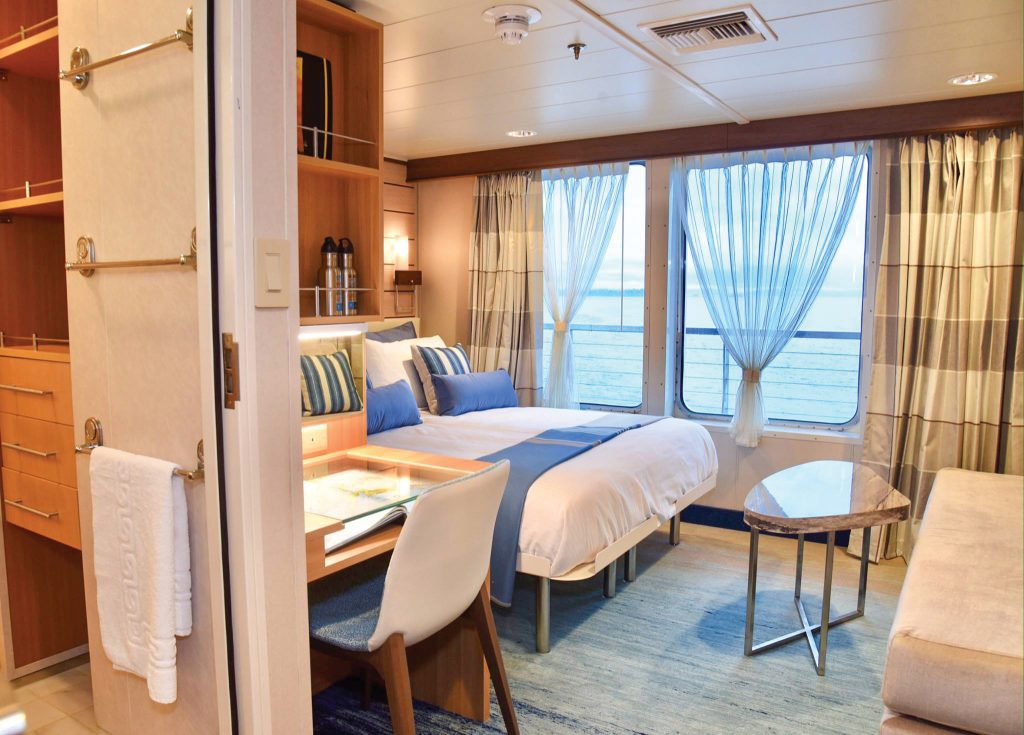
National Geographic Quest. * Photo: Lindblad Expeditions
Category 3 cabins on the Upper Deck have a layout similar to those on the Main Deck with the biggest advantage being a large window. The 22 Category 4 cabins on the Upper Deck have a sliding glass door and a small, private balcony. Cabins on the Observation Deck are Category 5 suites. They feature two lower single beds that can convert to a queen, large windows, an expanded bathroom, writing desk, ample storage space and a convertible sofa to accommodate a third person.
All cabins have Wi-Fi access (which is available throughout the ship), individual temperature controls, standard and USB outlets, writing desk and chair, magazine racks with National Geographic publications and an atlas, shelving and ample closet space, a full mirror, refillable water bottles and space for luggage storage. Bathrooms are stocked with botanically-inspired hair products, soap and shower gel, a hairdryer and an “Expedition Essentials Kit” containing moisturizer, lip balm, sunscreen and a loofah.
Although the Quest may not cater to the luxury or traditional family vacation market, she overachieves on her mission of hands-on exploration and observation of the world. The experience will appeal to passengers with a quest for discovery and preservation of the planet.
After her inaugural season in Alaska and the Pacific Northwest, the Quest repositioned to Costa Rica and Panama in late 2017 with eight-, 11- and 15-day itineraries. A series of voyages in Belize and Guatemala started in mid-February 2018. She will return to the Pacific Northwest, sailing the Columbia and Snake rivers, in April 2018 before heading back to coastal Alaska for the spring and summer season.
Don’t miss a post about small-ship cruising, subscribe to QuirkyCruise.com for monthly updates & special offers!
© This article is protected by copyright, no part may be reproduced by any process without written permission from the author. All Rights Reserved. QuirkyCruise.com.

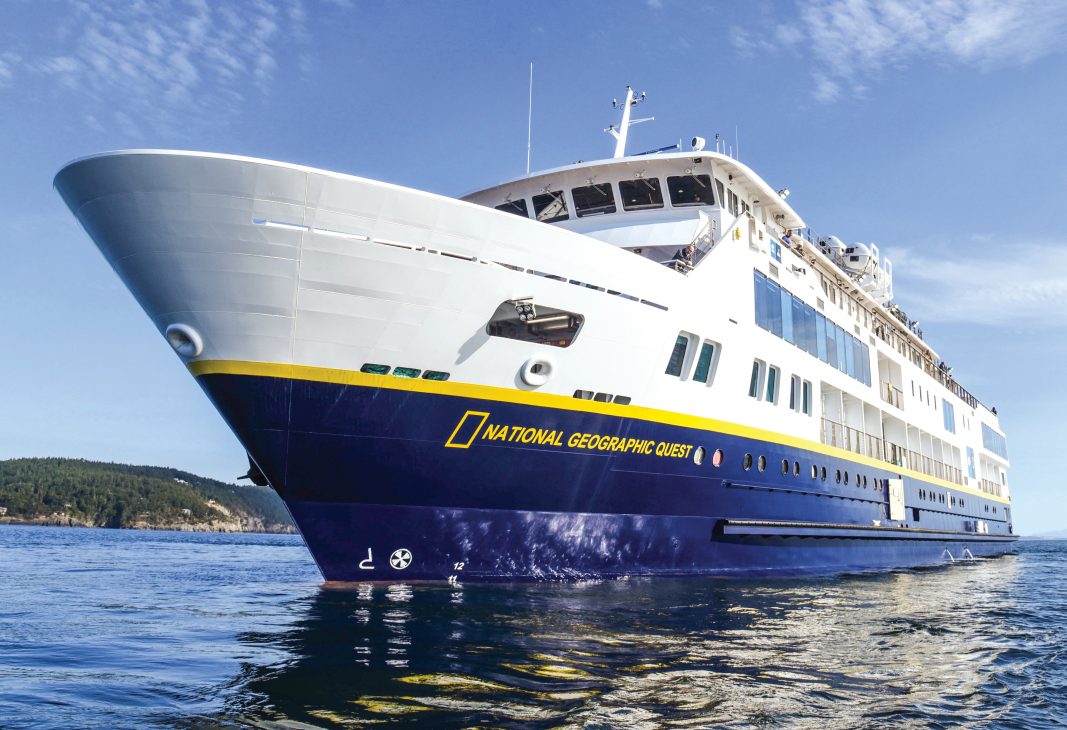
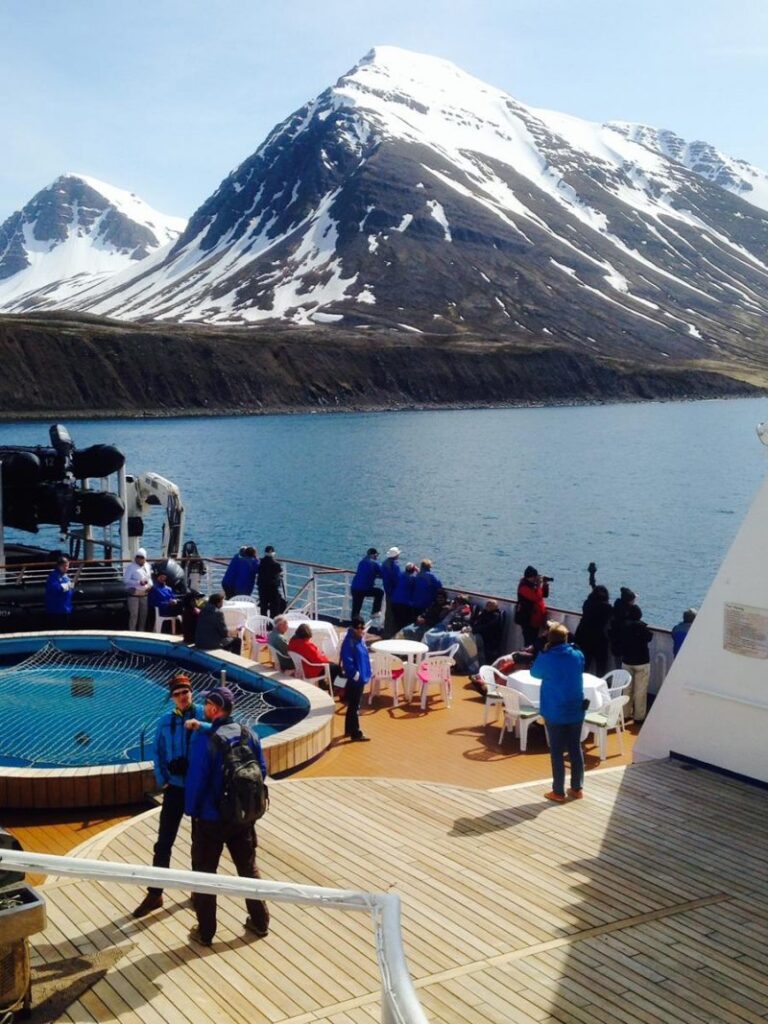
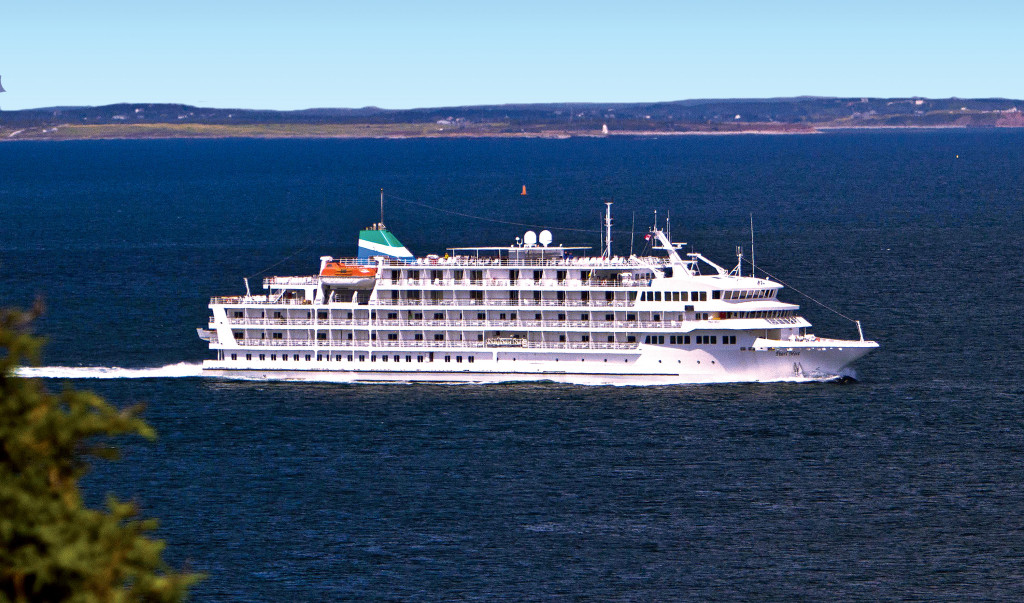
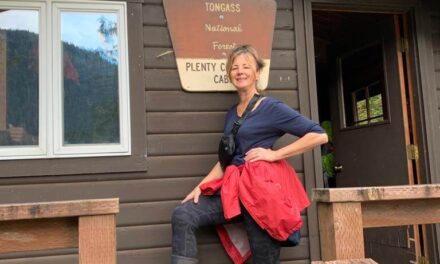
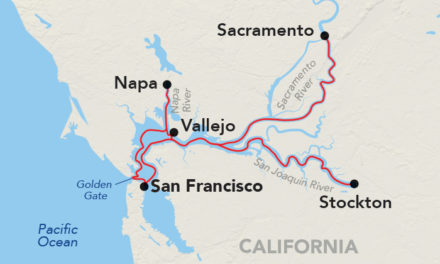

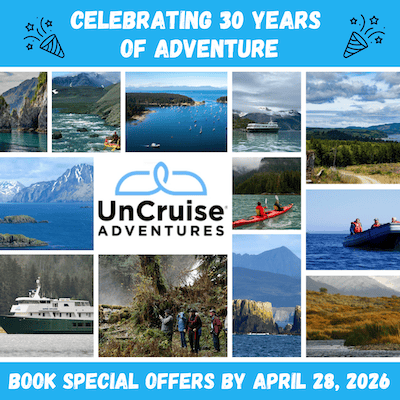
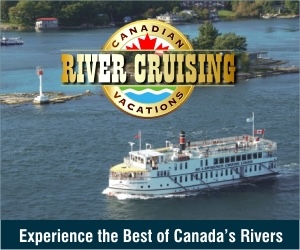

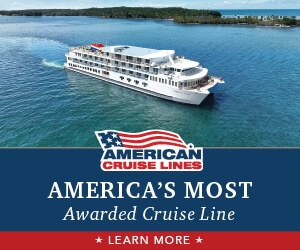




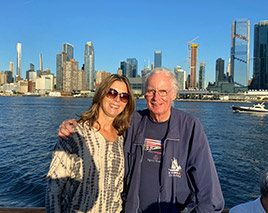 HEIDI SARNA
HEIDI SARNA
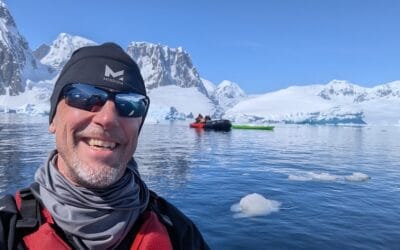

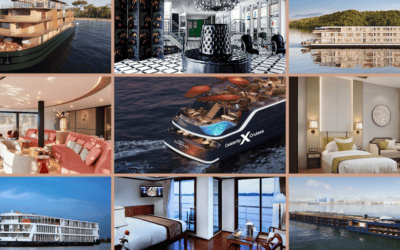
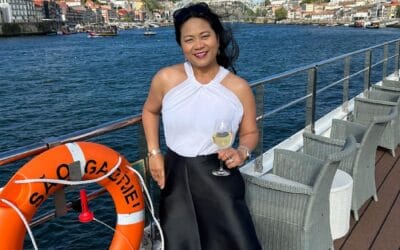
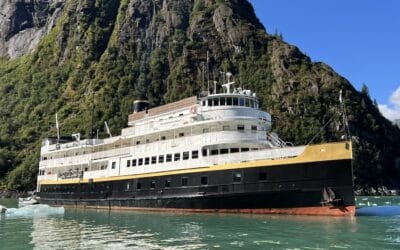
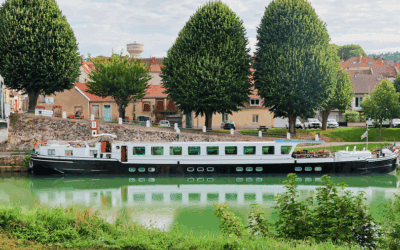
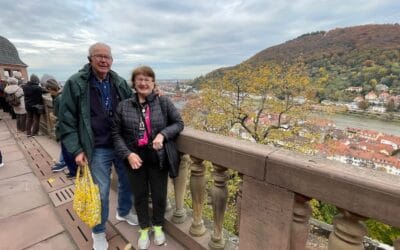
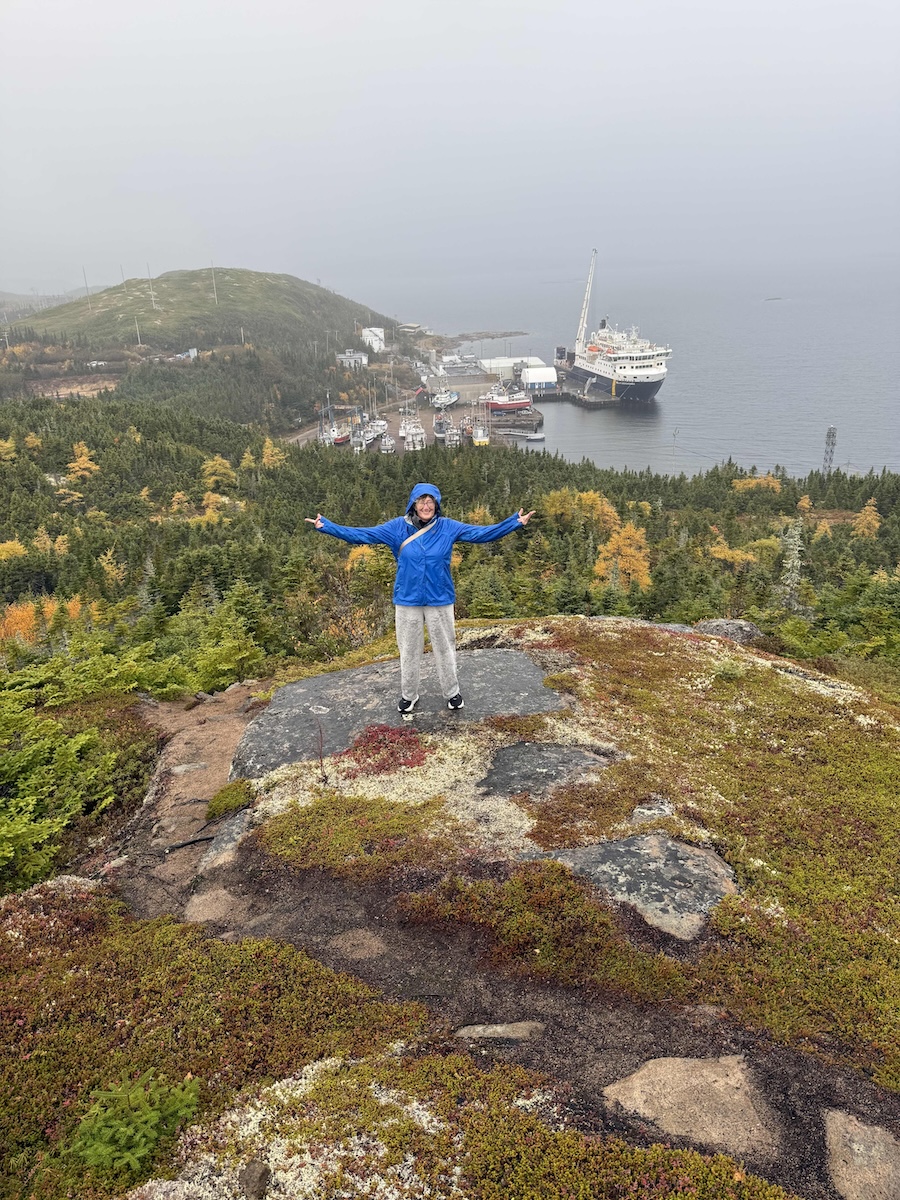
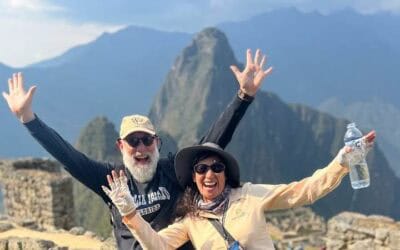
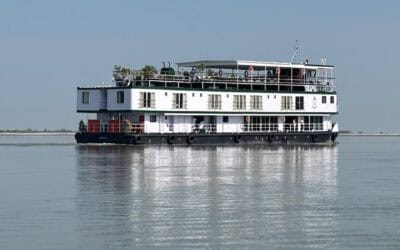
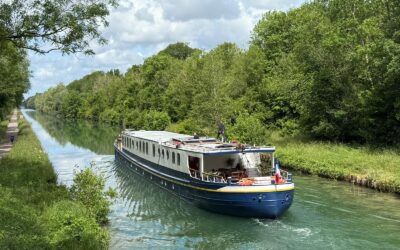

Great Article – Thanks
Glad you liked it 🙂